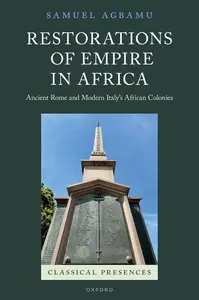
Free Download Restorations of Empire in Africa
by Samuel Agbamu;
English | 2024 | ISBN: 0192848496 | 312 pages | True PDF EPUB | 16.61 MB
The histories of Europe and Africa are closely intertwined. At times, this closeness has been emphasized, at other times, suppressed and denied. Since the nineteenth century, European imperial powers have carved up the continent of Africa among themselves, drawing borders and charting shorelines; in the process, inventing Africa. This was a project anchored in ancient Greek and Roman representations of Africa. For Italy, colonialism in Africa was a matter of consolidating its project of national unification, nominally completed in 1870 with the capture of Rome. By asserting its position as an imperial power, the young nation of Italy hoped to join the club of European nation-states and, in so doing, be rid of the perception that it was a country somewhere in between Europe and Africa. Yet, Italy's colonial endeavour in Africa was also a project with deep historical meaning. Italy posed its imperial project in Africa as a national return to territory which was rightfully Italian. Italian ideologues of imperialism based this claim on the history of Roman history on the continent. When Italian soldiers disembarked on the beaches of Libya during Italy's invasion of 1911-1912, and came across the ruins of Roman imperialism, they were, according to prominent cultural and political figures in Italy, rediscovering the traces of their ancestors. Yet, when Italian imperial ambitions set their sights on East Africa, regions that had not been conquered by Rome, how could Italy nevertheless shape its imperial project in the image of ancient Rome? This book charts this story. Beginning with Italy's first imperial endeavours on the African continent in the last decades of the nineteenth century and continuing right through to Italy's current attitudes towards Africa, this book argues that empire in Africa was a central aspect of Italian nation-building, and that this was a project which anchored itself in memories of ancient Rome in Africa. Although Fascism's invasion of Ethiopia (1935-1936) is the best-known moment of Italian imperialism in Africa, this book shows that Italian imperialism, modelled on ancient Rome, has a history which long predates Mussolini's movement, and has a legacy which continues to be acutely felt.
